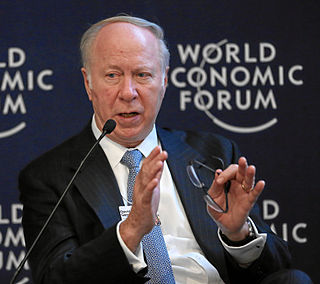A Quote by David Gergen
At the heart of leadership is the leader's relationship with followers. People will entrust their hopes and dreams to another person only if they think the other is a reliable vessel.
Related Quotes
Often, in a given project team or network, one sees leadership roles shifting among various members at various times. Attempts to fit these into traditional views of "leader" and "follower" don't quite work. It's more like Twitter: the "leader" has "followers" - but the "followers" are empowered to alter the relationship unilaterally, and the "leader" must continually earn the consent of the "followers."
The position does not make you a leader. The title, the promotion, the fancy corner office do not make you a leader. No, it is relationships with people that are the foundation, the very heart of leadership. Have you ever worked for someone you didn't like? It's difficult, isn't it? On the other hand, the leader you will follow anywhere and everywhere is one you know cares about you, and values you. This person has your best interests at heart. It is the leader who comes alongside to help you improve and grow.
Moral authority is another way to define servant leadership because it represents a reciprocal choice between leader and follower. If the leader is principle centered, he or she will develop moral authority. If the follower is principle centered, he or she will follow the leader. In this sense, both leaders and followers are followers. Why? They follow truth. They follow natural law. They follow principles. They follow a common, agreed-upon vision. They share values. They grow to trust one another.
Generally speaking, followers will not commit themselves for very long to a leader who is not also a pragmatist. As most of us have discovered, dreams are only powerful when we believe they can come true. Pipe dreams belong in the realm of fantasy; leaders' dreams belong in the realm of possibility.
More than anything else today, followers believe they are part of a system, a process that lacks heart. If there is one thing a leader can do to connect with followers at a human, or better still a spiritual level, it is to become engaged with them fully, to share experiences and emotions, and to set aside the processes of leadership we have learned by rote.
Not many of us will be leaders; and even those who are leaders must also be followers much of the time. This is the crucial role. Followers judge leaders. Only if the leaders pass that test do they have any impact. The potential followers, if their judgment is poor, have judged themselves. If the leader takes his or her followers to the goal, to great achievements, it is because the followers were capable of that kind of response.
Absolutely. I think, I think the American people, at their core, are a decent people. I think that we still have prejudice in our midst, but I think that the vast majority of Americans are willing, are willing to judge people on the basis of their ideas and their character. And in the case of the presidency, I think what's most important is whether the American people think that you understand their hopes and dreams and struggles and whether they think you can actually help them achieve those hopes and dreams.
Trust is perhaps the most critical single building block underlying effectiveness. Without trust leaders do not have followers. Without trust, leaders are impotent despite great rhetoric or splendid ideas. Trust rests on the belief among followers that the leader is transparent: What you see is what there is. Trust means followers believe there is no duplicity; no manipulation just to satisfy the leader's ego. Very simply: The effective leader is transparent; that's why that person is trusted.
Rob Goffee and Gareth Jones wrote a great piece in Harvard Business Review titled "Managing Authenticity." In it, they argue that establishing authenticity as a leader is a two-part challenge: "First, you have to ensure that your words are consistent with your deeds; otherwise, followers will never accept you as authentic. The second challenge of authentic leadership is finding common ground with the people you seek to recruit as followers.
Over the course of the millennia, all these ancestors in your tree, generation upon generation, have come down to this moment in time-to give birth to you. There has never been, nor will ever be, another like you. You have been given a tremendous responsibility. You carry the hopes and dreams of all those who have gone before. Hopes and dreams for a better world. What will you do with your time on this Earth? How will you contribute to the ongoing story of humankind?

































